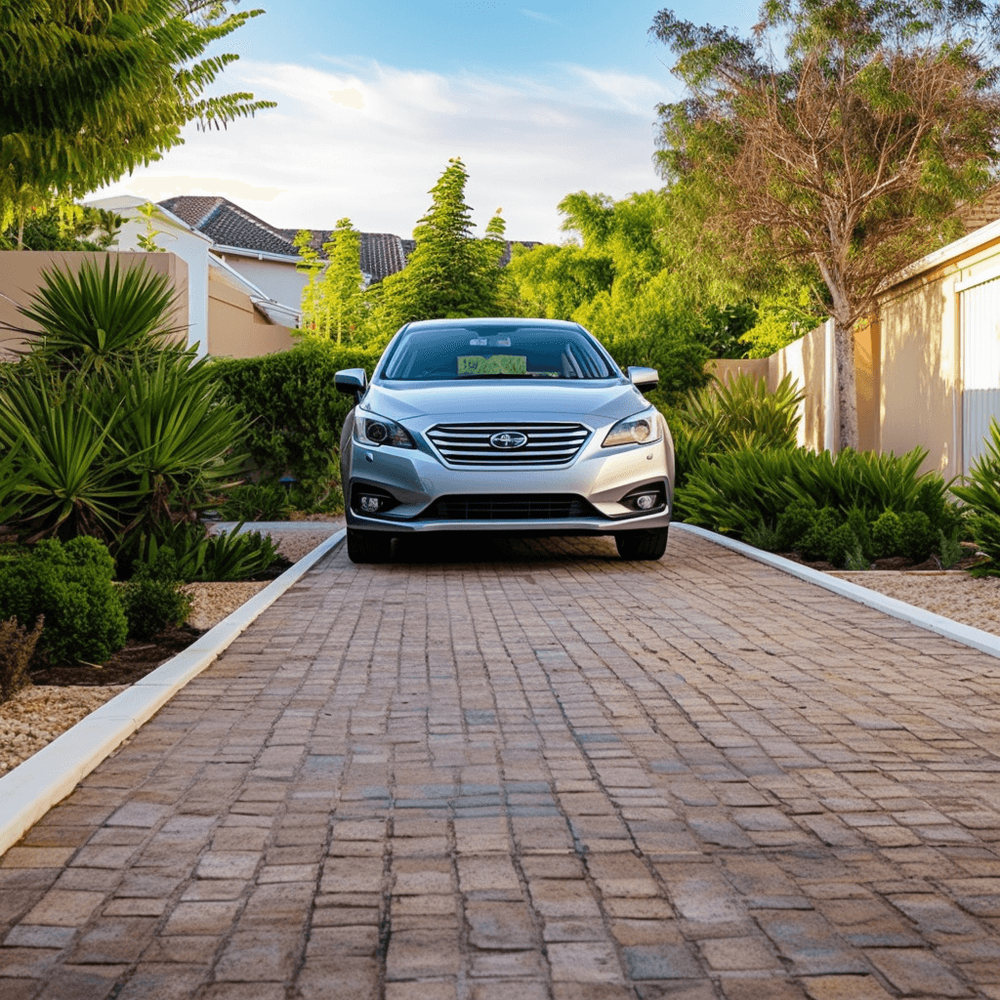
Picture this: you’ve just spent a sunny Arizona afternoon meticulously landscaping your dream outdoor oasis, only to discover an unsightly oil stain tarnishing the perfection of your pristine pavers.
n
Fear not, for we have concocted the ultimate go-to guide for effortlessly removing those pesky blemishes. With step-by-step instructions and an array of tried-and-tested techniques, you’ll be able to restore the charm of your concrete driveways and patios with ease.
Key Takeaways
- n
- Liquid dish soap and vinegar are effective household items for removing oil stains from pavers.
- Regular sealing of pavers can help prevent oil stains from penetrating the surface.
- Prompt clean-up is essential when dealing with oil stains to prevent them from becoming stubborn and reduce slipping hazards.
- Using eco-friendly alternatives such as bio-remediation products and natural enzymes can remove stains while protecting the environment.
n
n
n
n
Methods For Removing Oil Stains From Pavers
Learn how to remove oil stains from pavers with these effective methods: using laundry detergent or liquid dish soap, cleaning pavers with vinegar, using a cleaner/degreaser solution, using kitty litter for absorption, and pressure washing.
Using Laundry Detergent Or Liquid Dish Soap
Ah, the power of trusty laundry detergent and liquid dish soap – who knew they would be your ultimate weapon against those pesky oil stains on pavers? Not only are these household staples highly effective in removing grease and grime from everyday objects, but they also work wonders on stubborn oil stains that tend to tarnish your beautiful Arizona landscape.
n
To embark on this magical cleanup journey, simply squirt a generous amount of laundry detergent or liquid dish soap directly onto the offending stain. Then let it sit there for about 20-30 minutes as if it were sunbathing by one of Arizona’s many sparkling pools.
n
While basking under your watchful gaze, our hero (the humble suds-maker) will diligently penetrate deep within those unsightly specks and break apart greasy deposits, loosening their grip on your precious pavers.
Cleaning Pavers With Vinegar
Vinegar is a versatile household item that can be used for cleaning and disinfecting various surfaces, including pavers. To ,clean oil stains on brick pavers, mix equal parts white vinegar and water in a spray bottle.
n
Spray the solution directly onto the stain and let it sit for about 30 minutes before scrubbing with a deck brush or stiff-bristled brush.
n
Vinegar works by breaking down grease and oil molecules, making it an effective cleaner for removing stubborn stains on pavers. However, be careful not to use too much vinegar as it may damage sealants or coatings on some types of pavers.
Using A Cleaner/Degreaser Solution
For stubborn oil stains on pavers, a commercial cleaner or degreaser solution can be an effective choice. Products like Grimex are specifically designed to break down and dissolve tough grease and oil stains, making them easier to remove.
n
Simply apply the cleaner directly to the stain and allow it to soak for several minutes before scrubbing with a deck brush or pressure washing. It’s important to note that while these products can be highly effective, they should always be used carefully and in accordance with the manufacturer’s instructions to avoid damaging your pavers or harming nearby plants.
Using Kitty Litter For Absorption
Kitty litter is a common household item that can be used to absorb oil stains on pavers. It works by drawing the oil out of the surface and trapping it in the granules. To use, simply sprinkle a layer of kitty litter over the stain, gently pressing it down with your hand or a broom.
n
Allow it to sit for several hours or overnight before sweeping it away and disposing of properly.
n
In addition to using kitty litter, remember to always blot up as much of the oil as possible before applying any cleaning solution. This will help prevent further spreading and ensure effective removal.
Pressure Washing
Pressure washing is an effective technique for removing stubborn oil stains from pavers, especially if the stains have been there for a while. Using high-pressure water, pressure washing can quickly blast away oil and grease stains that won’t come off with soap or cleaner solutions.
n
However, caution should be taken not to damage or displace the pavers during pressure washing. It’s recommended to hire a ,professional landscaping company experienced in pressure washing to ensure a thorough cleaning without damaging your pavers.

Additional Techniques For Removing Oil Stains
Baking soda, corn starch, WD-40, bleach (with caution), and a deck brush or scrub brush can also be used as additional techniques for removing oil stains from pavers.
Baking Soda
Baking soda is a versatile and affordable solution for removing oil stains from pavers. It works well by absorbing the oil and lifting it off the surface of the paper. To use baking soda, simply mix it with water to form a paste, then apply it to the stain.
n
Let it sit for at least 20 minutes before scrubbing away with a deck brush or scrub brush. For tougher stains, you can also add vinegar to create a more powerful cleaning solution.
n
Using baking soda as an eco-friendly alternative to chemical cleaners is not only effective but safe for both you and your outdoor environment in Arizona’s climate prone to dust storms and sandstorms.
Corn Starch
Corn starch is a natural absorbent that can help lift oil stains from pavers. Simply sprinkle cornstarch onto the stain and let it sit for at least 30 minutes before sweeping it away with a broom.
n
For deeper stains, mix the cornstarch with water to create a paste and apply directly to the affected area. Corn starch is an affordable and eco-friendly alternative to commercial degreasers or cleaners, making it an excellent option for those who prioritize sustainability in their landscaping routine.
WD-40
WD-40 is a multi-purpose lubricant and solvent that can also be used to remove oil stains from pavers. Simply apply the WD-40 directly onto the stain, let it sit for 20-30 minutes, and then scrub with a deck brush or scrub brush before rinsing off with water.
n
It’s important to note that while WD-40 can be effective at removing oil stains on pavers, it should be used with caution as it contains chemicals that could potentially damage the surface of your pavers.
Bleach (with Caution)
Bleach can be an effective method for removing oil stains from pavers, but caution should always be exercised. It is essential to dilute the bleach with water before using it on your pavers.
n
Undiluted bleach can cause discoloration and damage to the surface. Always test a small, inconspicuous area first before applying bleach to a larger stained area. Also, remember to wear gloves and eye protection when handling bleach as it can be harmful if it comes into contact with skin or eyes.
Deck Brush Or Scrub Brush
A deck brush or scrub brush can be a valuable tool when removing oil stains from pavers. These brushes are specifically designed to deep clean surfaces and remove tough stains like grease and oil.
n
To use a deck brush, simply mix your preferred cleaning solution with water and apply it directly to the stained area. Then, vigorously scrub the stain with the brush until it lifts off the surface of the paper.
n
The course bristles on these brushes allow for maximum impact without damaging your pavers in the process.

Tips For Preventing Oil Stains On Pavers
Regularly sealing your pavers can help prevent oil stains from penetrating the surface. Prompt clean-up of any spills or leaks can also minimize the chances of staining.
Regular Sealing
Regular sealing is an essential part of maintaining the cleanliness and appearance of your pavers or ,patio. By applying a sealant to your pavers once or twice a year, you can protect them from oil stains, dirt buildup, and other forms of damage.
n
There are many types of sealants available on the market that cater to different kinds of paving materials. For example, water-based sealers work well for concrete pavers, while solvent-based sealers are better suited for natural stones like granite and marble.
Prompt Clean-Up
Prompt clean-up is essential when dealing with oil stains on pavers. As soon as you notice an oil stain, take action immediately to prevent it from setting in. Use rags or paper towels to blot up any excess oil, and sprinkle absorbent granular material like kitty litter over the affected area.
n
Not only does prompt clean-up prevent the stain from becoming stubborn, but it also reduces the likelihood of slipping hazards caused by oily residue on your paver surfaces.
Avoiding Parking On Pavers
If you want to prolong the life of your pavers and avoid dealing with oil stains, it’s best to avoid parking on them altogether. Regularly driving over pavers can wear down the surface and make it more susceptible to staining and other forms of damage.
n
Instead, try installing additional parking spaces in your yard or driveway using materials like gravel or concrete that are better equipped for vehicular use. Additionally, consider marking off designated areas for cars to prevent any accidental parking on your beautiful paving stones.

Eco-Friendly Alternatives To Removing Oil Stains
This section explores natural and eco-friendly options for removing oil stains from pavers, including bio-remediation products, natural enzymes, and microorganisms.
Bio-remediation Products
Another eco-friendly alternative to removing oil stains from pavers is the use of bio-remediation products. These products contain natural enzymes and microorganisms that break down the oil molecules, making them easier to clean up.
n
Bio-remediation products are safe for both human health and the environment, making them an excellent choice for homeowners who want to maintain a sustainable outdoor living space.
n
For example, Green Gobbler’s Grease Trap Treatment is a highly effective product that can be used on concrete pavers, brick pavers, or asphalt driveways. It offers a non-toxic formula designed to digest fats, oils, grease (FOG), cellulose compounds, and proteins in one easy-to-use solution.
Natural Enzymes
Natural enzymes are a popular eco-friendly alternative to removing oil stains on pavers. These enzymes break down oils and grease, making it easier to remove the stain with soap and water.
n
They are safe for pets, plants, and people alike – ideal for homes with children or curious pets. Natural enzyme cleaners like Oil Solutions are highly effective in breaking up tough oil stains without damaging the pavers.
n
Simply apply the solution directly to the stain, let it sit for 15-20 minutes, then scrub gently with a deck brush.
n
Using natural enzymes provides an easy way of keeping your outdoor living spaces looking great without causing harm to people or other living things nearby.
Microorganisms
Microorganisms are a natural, eco-friendly solution for removing oil stains from pavers. These microorganisms work by breaking down the oil molecules and converting them into harmless substances like water and carbon dioxide.
n
Bio-remediation products that contain these microorganisms can be used to effectively remove tough oil stains without harmful chemicals or solvents, making it an ideal option for those who want to maintain a healthy and environmentally friendly yard.
n
Using microorganisms might take longer than using chemicals, but it’s worth considering since they are biodegradable and gentle on your concrete.
Conclusion.
There you have it, folks! A comprehensive guide on effortlessly removing oil stains from pavers. With the help of simple household items like liquid dish soap and vinegar, you can restore your concrete and brick surfaces to their former glory.
n
Remember to take preventative measures such as regular sealing and prompt clean-up to avoid future oily messes. And for those looking for eco-friendly alternatives, bio-remediation products, and natural enzymes are great options for removing stains while protecting the environment.
nn

